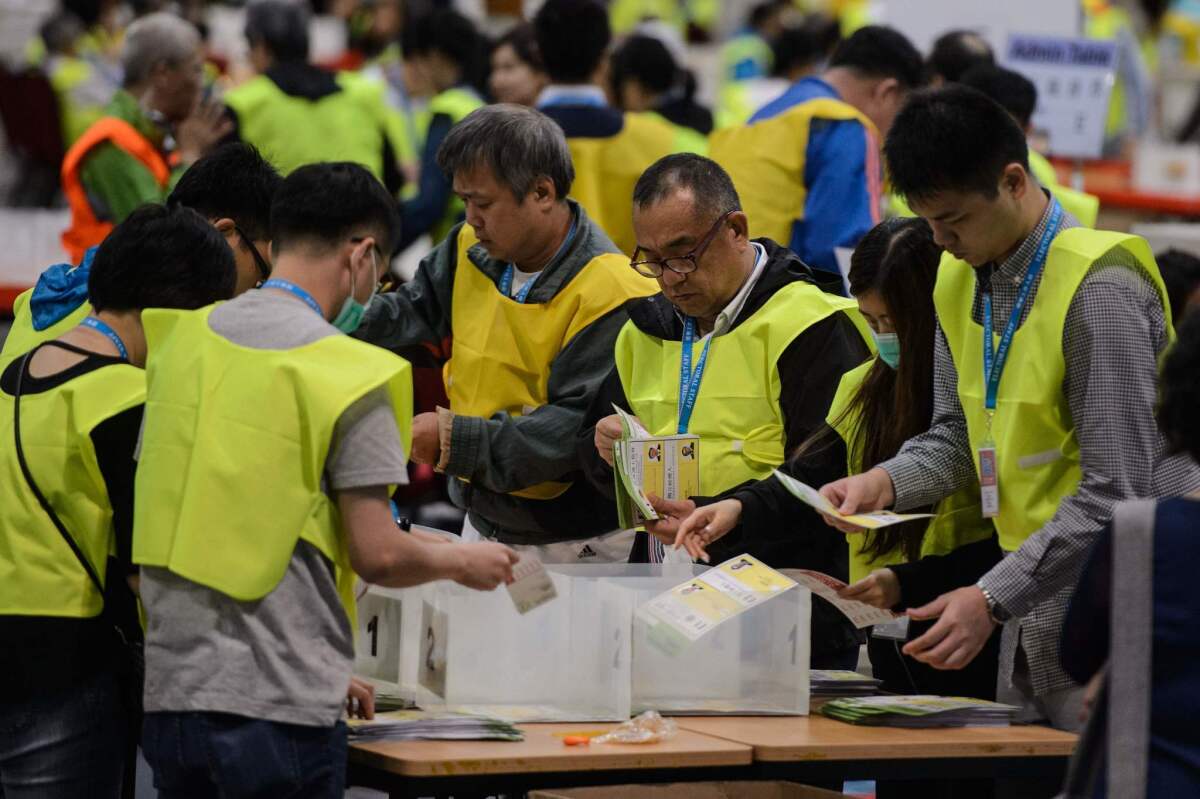Beijing’s dilemma when it comes to Hong Kong’s election: The more it pushes against it, the stronger the opposition

- Share via
Reporting from Beijing — This week, Hong Kong sent mainland China a stinging rejection of its authority and a brash demand for greater political freedom. Beijing barely acknowledged it.
As voters showed up in record numbers Sunday to catapult a handful of young, more radical citizens to Hong Kong’s legislature, mainland censors blocked images of election celebrations and snaking lines at the polls. No major state-controlled newspaper decried the results on its front page. Officials preoccupied themselves with the outcome of a world leaders’ summit in Hangzhou.
Few doubt Beijing is watching closely. But the relative silence highlights leaders’ fundamental conundrum when it comes to the territory: Blasting separatist efforts and projecting authority could strengthen opposition and showcase Hong Kong’s increasing distrust of China’s rule.
“The mainland clearly has a dilemma,” said David Zweig, director of the Center on China’s Transnational Relations at the Hong Kong University of Science and Technology. “It doesn’t like the trend, but the more it pushes against it, the greater the intensification.”
The strongest response so far came in a two-paragraph statement from the Beijing office that deals with Hong Kong affairs. It said officials “resolutely oppose any form of Hong Kong independence activity,” according to the official New China News Agency.
See the most-read stories this hour >>
The statement accused candidates of using the election as a platform to “openly promote” independence, saying such actions went against China’s constitution and Hong Kong law. A Foreign Ministry spokeswoman, when asked about the elections, directed reporters to that comment.
A day after the election, a database search by the University of Hong Kong’s China Media Project found exactly one Chinese-language article about it from mainland papers.
China clings to its territory with a rock-solid grip and has shown little restraint in quashing pro-independence movements in Tibet or the western region of Xinjiang. But Hong Kong, a former British colony, has functioned under a “one country, two systems” framework since 1997 that gives it civil liberties banned in the mainland — such as the right to hold these elections.
This situation lasts until 2047, although many Hong Kong residents increasingly believe Beijing is sidestepping the deal. Six of the new lawmakers — the youngest at 23 — come from a camp determined to give the territory a greater say in its future.
These activists-turned-legislators participated in a months-long tent protest in 2014 that demanded Beijing roll back new rules and let Hong Kong elect its next head without the Communist Party’s influence. Known as the Umbrella Movement, it ultimately failed.
The arrests last year of five Hong Kong booksellers who sold materials critical of the party further spooked residents uncertain whether Beijing intends to keep its vow that gives the city a “high degree of autonomy.”
The election results won’t do much to shift the 70-member legislature’s balance of power. But the young lawmakers’ win is a symbolic affront to a central government that dismisses any talk of self-rule.
“What’s Beijing to do? The bomb is in its court,” Michael Chugani, a columnist for the Hong Kong-based South China Morning Post, wrote this week. “It can’t toss it back. It has to disable it. But how?”
Chinese leaders already face friction with Taiwan and its newly elected leader, Tsai Ing-wen, because she hasn’t endorsed the notion that the democratic island and Communist mainland make up one China.
Concerns about China’s creeping encroachment have perpetuated tension in Hong Kong and fueled a broader climate of fear.
Eddie Chu, a 38-year-old social activist who ran a low-budget campaign and received the highest number of votes, sought police assistance Thursday for “imminent” threats to his life.
He received warnings before the election from a village leader upset with his stances and was trailed by a white car on election day, according to the South China Morning Post. But those threats escalated since his victory, he said, and he feared going home.
“This is a direct attack on the rule of law,” Chu told reporters outside a police headquarters. Ken Chow Wing-kan, a candidate from the pro-Beijing group who dropped out of the election, said this week that he left the race after a Beijing trio threatened him in a Shenzhen hotel. They demanded he drop out of the race to improve the chances of pro-establishment candidates, he said. Mainland leaders may have tempered their public reaction because they don’t view the situation as dire enough to stoke more concern.
Not all residents oppose the status quo. Regina Ip, a staunch pro-Beijing lawmaker, easily slid to reelection.
“The rise of young radicals … is a continuation of a polarization of our society after Occupy Central,” she said, in reference to the Umbrella Movement. She called for the government to show a “more consolatory approach to young people, a more collaborative approach.”
But Beijing hasn’t indicated how it will interact with this fresh political force.
“Is their priority to stop all these pro-independence people or restore an effective government in Hong Kong?” said Ray Yep, a political scientist at the City University of Hong Kong. “We’ll see.”
Postelection analysis dominated many Hong Kong news outlets into the week. The most popular topics on Weibo, China’s version of Twitter, centered on Taylor Swift’s breakup.
Meyers is a special correspondent. Nicole Liu and Yingzhi Yang from the Times’ Beijing bureau contributed to this report.
ALSO
Obama on Trans-Pacific trade deal: ‘I remain confident that we can get TPP passed’
Pandas removed from international endangered list, but China says they still face serious threat
Obama pays tribute to victims of U.S. bombings during the ‘secret war’ in Laos
More to Read
Sign up for Essential California
The most important California stories and recommendations in your inbox every morning.
You may occasionally receive promotional content from the Los Angeles Times.













